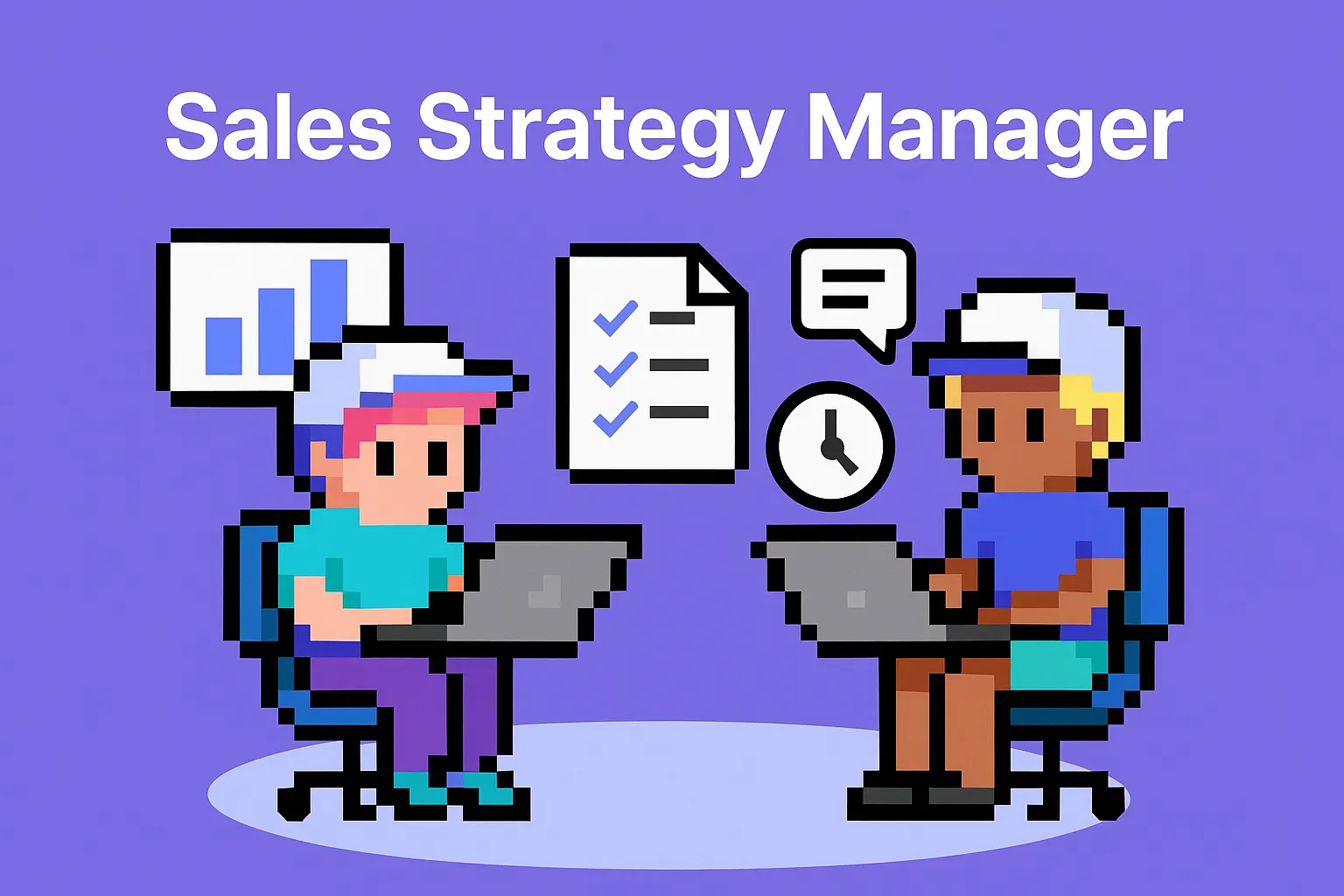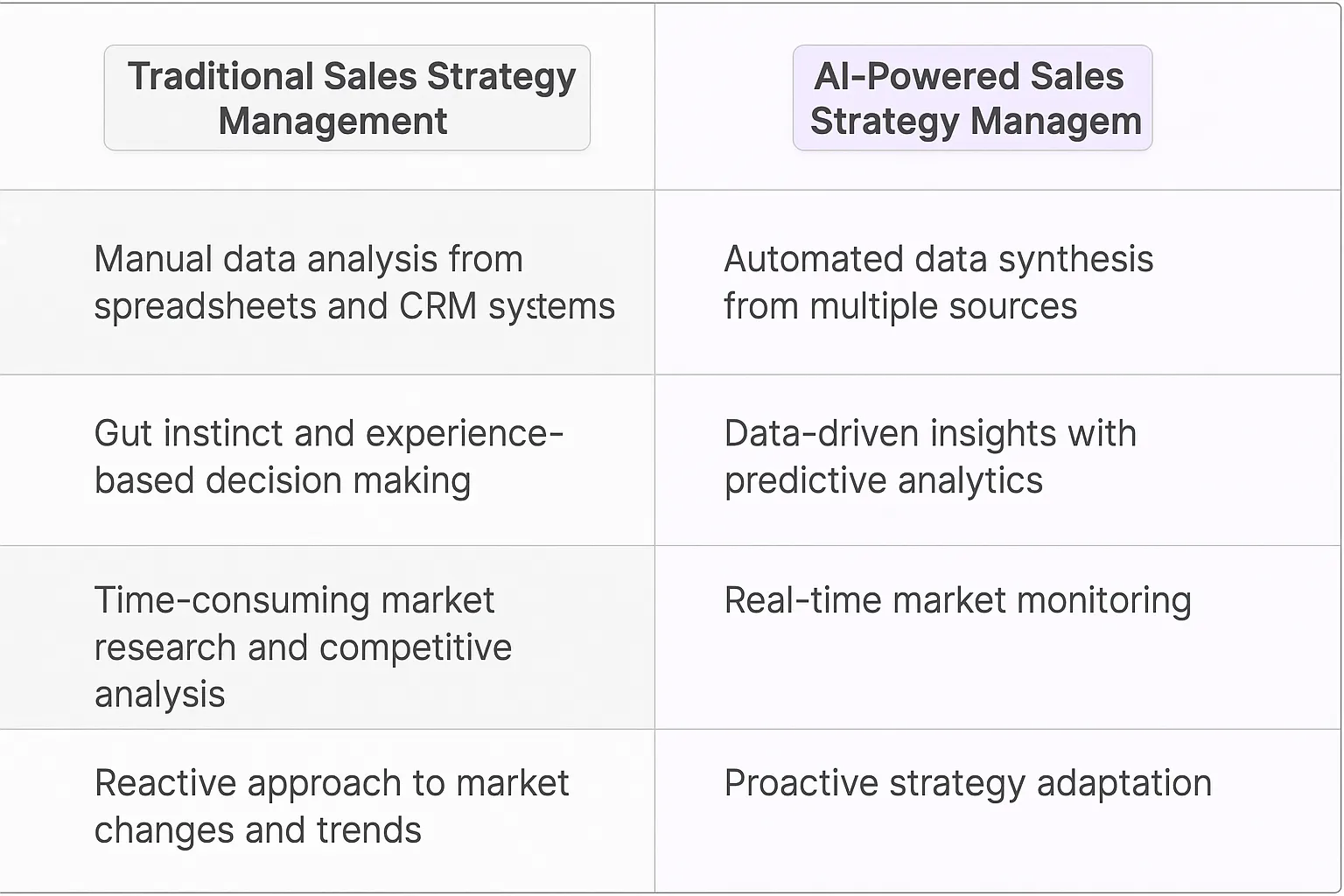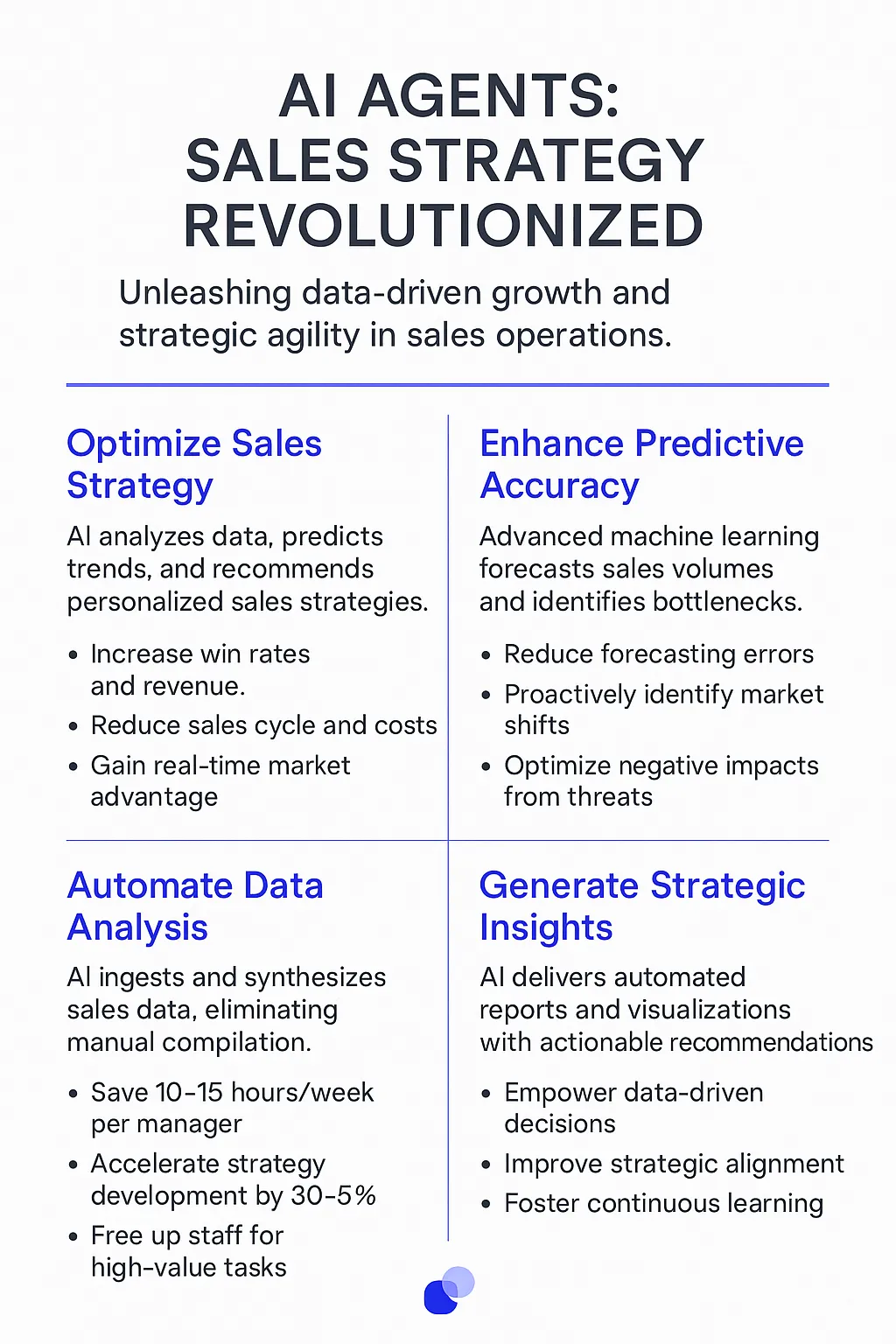Sales Strategy Manager is an AI-powered tool designed to augment and enhance the capabilities of sales professionals. It's not just another CRM systems or analytics platform; it's a sophisticated digital teammate that works alongside human strategists to develop, implement, and refine sales strategies. This tool leverages advanced machine learning algorithms to process vast amounts of data, identify patterns, and generate actionable insights that drive sales performance.
1. Predictive Analytics: The system uses historical and real-time data to forecast sales trends, customer behavior, and market shifts with uncanny accuracy.
2. Personalized Recommendations: It provides tailored strategies for individual clients or market segments, moving beyond one-size-fits-all approaches.
3. Continuous Learning: The AI constantly adapts and improves its models based on new data and outcomes, ensuring strategies remain cutting-edge.
4. Automated Reporting: It generates comprehensive reports and visualizations, saving hours of manual data compilation and analysis.
5. Integration Capabilities: The tool seamlessly integrates with existing CRM systems and sales tools, creating a unified ecosystem for sales strategy management.
6. Real-time Optimization: It allows for on-the-fly strategy adjustments based on emerging trends or sudden market changes.

Before AI agents entered the scene, sales strategy managers relied on a hodgepodge of tools and techniques. They'd spend hours poring over spreadsheets, CRM data, and market reports. It was like trying to piece together a 1000-piece puzzle with half the pieces missing. They'd use basic analytics tools, gut instinct, and a lot of coffee-fueled brainstorming sessions.
The process was slow, error-prone, and often led to strategies based more on hunches than hard data. It was the business equivalent of using a flip phone in the smartphone era - functional, but severely limited.
Enter AI agents, and suddenly it's like we've upgraded from that flip phone to the latest iPhone Pro Max. These digital teammates are game-changers, and here's why:
1. Data analysis on Steroids: AI agents can crunch through massive datasets faster than you can say "quarterly forecast." They spot patterns and insights that would take humans weeks to uncover. It's like having a team of data scientists working 24/7, but without the need for sleep or snacks.
2. Predictive Power: These agents don't just analyze past data; they use it to predict future trends with scary accuracy. It's like having a crystal ball, but one that's powered by algorithms instead of mystical energy.
3. Personalization at Scale: AI agents can tailor strategies for individual clients or market segments in real-time. It's the difference between a one-size-fits-all approach and a bespoke suit tailored to each customer's exact measurements.
4. Continuous Learning: Unlike static tools, AI agents learn and improve over time. They adapt to market changes, refine their predictions, and get smarter with each interaction. It's like having an intern who never graduates but keeps getting better at their job.
5. Time Liberation: By automating routine tasks and providing instant insights, AI agents free up sales strategy managers to focus on high-level thinking and relationship building. It's not about replacing humans; it's about amplifying their capabilities.
6. Bias Reduction: While not perfect, AI agents can help reduce human biases in decision-making. They don't play office politics or have favorite clients. They just follow the data, leading to more objective strategies.
7. Real-time Adaptation: In a world where market conditions can change in the blink of an eye, AI agents provide the agility to pivot strategies on the fly. It's like having a co-pilot who's always scanning the horizon for turbulence.
The bottom line? AI agents are transforming sales strategy from an art into a science - but a science that still needs the human touch to truly shine. They're not replacing strategy managers; they're empowering them to operate at a whole new level. It's not about man vs. machine, it's about man and machine creating a new paradigm of sales excellence.

Sales strategy managers are constantly juggling multiple balls in the air. They're tasked with developing and implementing strategies that drive revenue growth, analyzing market trends, and guiding sales teams to success. Enter AI agents - these digital teammates are poised to transform how sales strategy managers operate.
One key process where AI agents shine is in market analysis. They can sift through vast amounts of data, identifying patterns and trends that humans might miss. This isn't just about crunching numbers; it's about uncovering insights that can shape entire sales strategies. For instance, an AI agent could spot a subtle shift in customer behavior across different regions, allowing the sales strategy manager to pivot their approach before competitors even notice the change.
Another critical process is sales forecasting. AI agents can take historical data, current market conditions, and even external factors like economic indicators to create more accurate predictions. This isn't your grandfather's sales forecast - it's a dynamic, constantly updating view of where your sales are headed. Sales strategy managers can use these insights to make real-time adjustments to their plans, allocating resources more effectively and maximizing ROI.
When it comes to specific tasks, AI agents are like having a team of tireless interns who never sleep and never complain about doing the grunt work. They can automate the tedious parts of a sales strategy manager's job, freeing up time for high-level thinking and strategy development.
One task where AI agents excel is in competitive analysis. They can continuously monitor competitors' activities, from pricing changes to new product launches, and alert the sales strategy manager to significant developments. This isn't just about keeping tabs on the competition; it's about staying one step ahead in the market chess game.
AI agents can also take on the task of lead scoring and prioritization. By analyzing a multitude of data points - from a prospect's engagement with marketing materials to their company's recent financial performance - these digital teammates can identify the most promising leads. This allows sales teams to focus their efforts where they're most likely to pay off, increasing efficiency and conversion rates.
Another valuable task for AI agents is in sales performance analysis. They can dive deep into individual and team performance metrics, identifying top performers and areas for improvement. But it's not just about the numbers - these AI agents can also analyze the qualitative aspects of sales calls, providing insights into successful techniques and areas where additional training might be beneficial.
The potential of AI agents in sales strategy management is vast. They're not replacing human creativity and intuition; they're augmenting it. By taking on time-consuming tasks and providing data-driven insights, AI agents are enabling sales strategy managers to focus on what they do best: developing innovative strategies that drive growth and outmaneuver the competition. As these technologies continue to evolve, we're likely to see a new breed of sales strategy managers emerge - ones who are as comfortable with AI-driven insights as they are with traditional sales techniques.

The versatility of AI agents in Sales Strategy Management makes them valuable across various industries. Let's dive into some meaty, industry-specific use cases that showcase how AI can transform workflows and processes in ways you might not expect.
These aren't your run-of-the-mill efficiency boosters. We're talking about AI agents that act as your sales strategy co-pilots, bringing a level of insight and adaptability that can make the difference between hitting your targets and blowing them out of the water. From tech startups to Fortune 500 giants, these digital teammates are reshaping how we approach sales strategy across the board.
What's particularly exciting is how these AI agents are breaking down the traditional barriers between data analysis, strategy formulation, and execution. They're not just number crunchers or glorified to-do list managers. These are sophisticated systems that can spot trends, suggest pivots, and even help craft personalized pitches on the fly.
So, let's explore how different industries are leveraging these AI-powered sales strategy managers to gain a competitive edge and drive growth in ways that were previously unimaginable. Trust me, some of these use cases might just make you rethink your entire approach to sales strategy.
The retail industry is ripe for disruption, and Sales Strategy Manager AI agents are poised to be the catalyst. Let's dive into how these digital teammates can transform the way retail businesses operate and compete in an increasingly cutthroat market.
Picture a high-end fashion retailer with stores across major cities. Traditionally, their sales strategy relied heavily on the intuition of seasoned managers and historical data. Enter the Sales Strategy Manager AI, and suddenly, the game changes dramatically.
This AI doesn't just crunch numbers; it's a strategic powerhouse. It analyzes vast amounts of data - from foot traffic patterns and weather forecasts to social media trends and economic indicators. But here's where it gets interesting: it doesn't just tell you what happened; it predicts what will happen and recommends how to capitalize on it.
For instance, the AI might notice that every time a certain influencer posts about "retro chic," there's a spike in vintage-inspired purchases within 48 hours. It then suggests a targeted campaign to showcase the store's retro collection, timed perfectly to ride this wave of interest. This level of precision in trend-spotting and response time is simply impossible for human managers to achieve consistently.
But it doesn't stop there. The AI also optimizes inventory management, ensuring that the right products are in the right stores at the right time. It might recommend shifting summer stock from Seattle to Miami earlier than usual, based on weather pattern analysis and local event calendars.
Perhaps most impressively, the AI can personalize sales strategies down to the individual store level. It might suggest that the New York flagship store focus on high-end, limited edition pieces due to its proximity to fashion-forward clientele, while recommending that the suburban Chicago location emphasize family-friendly promotions.
The result? A retail operation that's not just reactive, but proactive and predictive. It's like having a team of the world's best retail strategists working 24/7, but with superhuman data processing capabilities and zero bias.
This isn't just about increasing sales (though it certainly does that). It's about creating a more responsive, efficient, and customer-centric retail experience. It's about staying ahead in a world where consumer preferences can shift overnight.
In the end, the retailers who embrace these AI-powered sales strategies won't just survive; they'll thrive, leaving their competitors wondering what hit them. Welcome to the future of retail - it's smarter, faster, and more exciting than we ever imagined.
The real estate industry is on the cusp of a major transformation, and Sales Strategy Manager AI agents are the driving force behind this change. These digital teammates are not just tools; they're game-changers that are redefining how properties are bought, sold, and marketed.
Consider a mid-sized real estate firm operating in a competitive metropolitan area. Traditionally, their sales strategy relied on the experience of veteran agents and basic market trends. Now, with a Sales Strategy Manager AI at the helm, they're playing a whole new ballgame.
This AI isn't just a glorified spreadsheet; it's a strategic mastermind. It processes an enormous amount of data - from neighborhood gentrification patterns and school district ratings to local business openings and crime statistics. But here's where it gets fascinating: it doesn't just report on current trends; it forecasts future market movements and recommends tailored strategies to capitalize on them.
For example, the AI might detect that areas with new craft breweries and artisanal coffee shops see a 15% increase in property values within 18 months. It then suggests targeting first-time millennial homebuyers in these up-and-coming neighborhoods, crafting marketing messages that highlight the vibrant local scene and potential for appreciation.
The AI's capabilities extend far beyond trend analysis. It optimizes the entire sales funnel, from lead generation to closing. It might recommend that agents focus on Instagram for luxury condo listings, while pushing Facebook ads for suburban family homes, based on detailed demographic and behavioral data.
One of the most powerful features is the AI's ability to personalize sales strategies for individual properties. It might suggest staging a downtown loft with a home office setup to appeal to remote workers, while recommending family-friendly features for a suburban listing near good schools.
The impact? A real estate operation that's not just reactive to market conditions, but proactive and predictive. It's like having a team of the world's top real estate analysts working round the clock, but with superhuman data processing abilities and zero emotional bias.
This shift isn't just about selling more properties (although it certainly does that). It's about creating a more efficient, responsive, and client-focused real estate experience. It's about staying ahead in a market where buyer preferences and economic conditions can shift rapidly.
In the end, the real estate firms that embrace these AI-powered sales strategies won't just survive; they'll dominate their markets, leaving their competitors scrambling to catch up. This is the future of real estate - it's data-driven, hyper-personalized, and more dynamic than we ever thought possible.
Implementing a Sales Strategy Manager AI Agent isn't just about plugging in some fancy algorithm and watching the magic happen. It's a complex dance of data, integration, and machine learning that can make even the most seasoned tech teams break a sweat.
First off, you're dealing with a massive amount of data from various sources - CRM systems, market trends, customer interactions, and historical sales performance. Cleaning, normalizing, and making sense of this data tsunami is a Herculean task. Your AI needs to be a polyglot, speaking the language of Salesforce, HubSpot, and every other tool in your sales stack.
Then there's the challenge of real-time processing. Sales strategies aren't set-and-forget; they need to adapt on the fly. Your AI needs to crunch numbers faster than a caffeinated day trader, spotting patterns and making recommendations before your sales team has even had their morning coffee.
And let's not forget about the black box problem. If your AI is making crucial strategy decisions, you need to be able to peek under the hood and understand why. Explainable AI isn't just a nice-to-have; it's essential for building trust and refining your model.
On the operational side, implementing a Sales Strategy Manager AI Agent is like trying to change the tires on a moving car. Your sales team doesn't stop selling just because you're rolling out new tech.
Change management is the 800-pound gorilla in the room. Sales reps are creatures of habit, and asking them to trust an AI with their strategies is like asking a chef to let a robot season their signature dish. You need a rock-solid adoption plan that shows clear value and doesn't disrupt existing workflows.
There's also the question of how much autonomy to give your AI. Should it be making decisions, or just offering suggestions? Get this wrong, and you could end up with a team of demoralized sales reps who feel like they're just following orders from a machine.
Data privacy and security are another minefield. Your AI is handling sensitive customer and sales data. One breach, and you're not just losing deals; you're losing trust and potentially facing legal consequences.
Finally, there's the ongoing challenge of keeping your AI sharp. Sales landscapes change faster than fashion trends. Your AI needs constant training and fine-tuning to stay relevant. It's not a set-it-and-forget-it solution; it's more like adopting a very demanding, data-hungry pet that needs constant attention and care.
Implementing a Sales Strategy Manager AI Agent is a journey, not a destination. It's a complex, multifaceted challenge that requires technical prowess, operational finesse, and a deep understanding of the sales process. But get it right, and you've got a digital teammate that can give your sales team superpowers.
The integration of AI agents into sales strategy management isn't just a trend; it's a paradigm shift. These digital teammates are redefining what's possible in sales, enabling sales strategy managers to operate with unprecedented precision, speed, and insight. From retail to real estate, AI agents are proving their worth by uncovering hidden opportunities, predicting market shifts, and personalizing strategies at scale.
However, the journey isn't without its challenges. Technical hurdles like data integration and real-time processing, coupled with operational challenges such as change management and maintaining the human touch in sales, require careful navigation. But for those who successfully implement these AI-powered solutions, the rewards are transformative.
As we look to the future, it's clear that the most successful sales organizations will be those that effectively blend human creativity and intuition with AI-driven insights. The Sales Strategy Manager of tomorrow won't just be a skilled professional; they'll be an AI-augmented strategist, capable of making decisions and driving growth in ways we're only beginning to imagine. The future of sales strategy is here, and it's powered by AI.